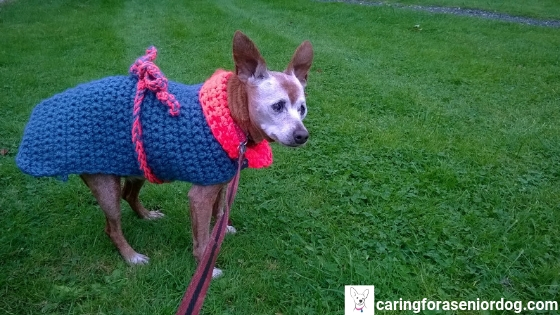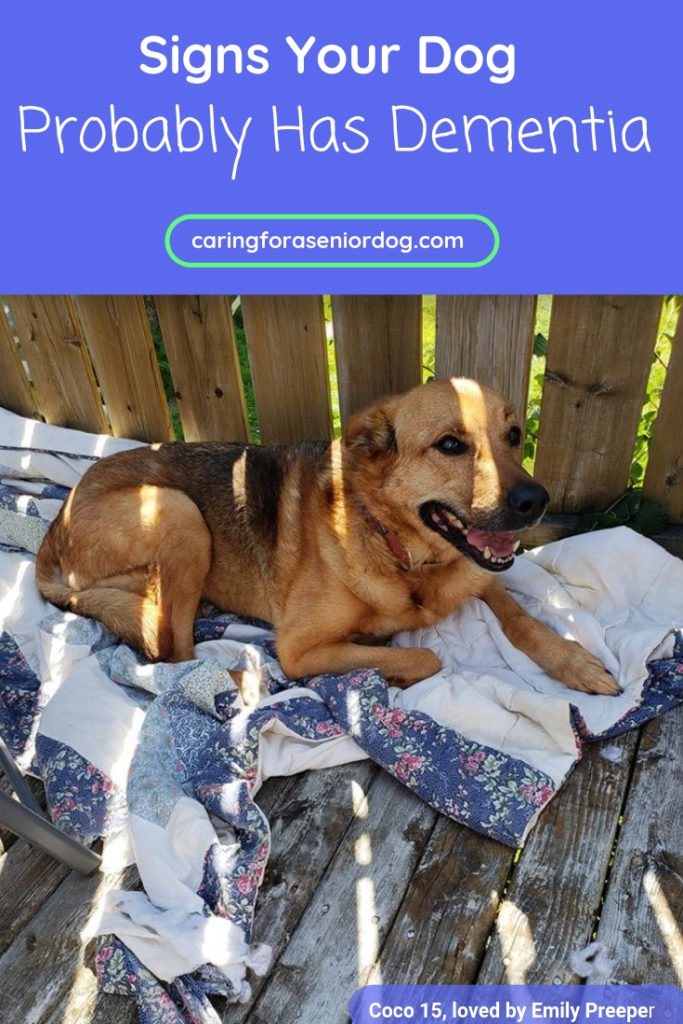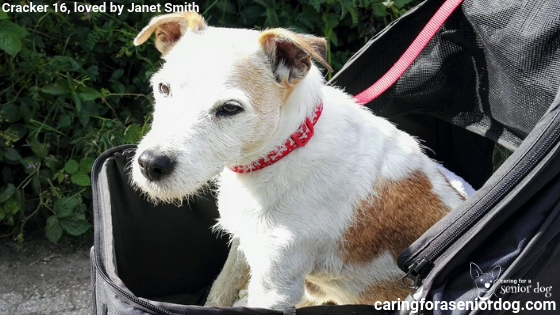
My old dog Red had doggie dementia for about two and a half years. It was a condition I was not familiar with and totally unprepared for. My usually amazing vet never mentioned the possibility, even after tests to explain certain behaviours came back negative. One day the word “dementia” popped into my head, who knows how, and when I asked my vet about it he told me it made sense.
I went through a lot of stress, frustration and feelings of hopelessness and helplessness before I figured out what was wrong. I hope to save many of you from the same which is why I wrote this post.
UPDATE: This post was originally written Nov 23, 2015 and updated Dec 17, 2018. My heart dog Red crossed the rainbow bridge on May 18, 2018.

Probably but not definitely
Many of the signs you will see listed could be attributed to other conditions. For example, your dog pacing and not being able to settle could mean she’s in pain. Not acknowledging or interacting with people she knows may mean she can’t hear them enter the room or see them.
Don’t ignore changes
If you notice behaviour changes, even if it’s something small like your dog seeming a bit “off” please call your vet. A problem caught early has a much better chance of being treated or managed.
Diagnosing dementia
There is no test to confirm a dementia diagnosis, it is made through a process of elimination. Since many of the same symptoms can be attributed to other illnesses, tests are conducted to rule them in or out. If they are all ruled out then it’s typically doggy dementia.
Treating dementia
I have included a link to an article I wrote about treatment options, so there’s no need to repeat all that. The one thing I will say is, ask your vet about the prescription drug selegeline, the active ingredient found in Anipryl in the U.S. and Canada and Selgian in the UK. I don’t know what the drugs are called in other countries.
I say this because I know from my own experience as well as others, many vets don’t even mention the drug because they don’t believe it works for enough dogs. I disagree with that attitude because it doesn’t have to work for enough dogs, it just has to work for YOURS and Selgian definitely worked for mine.
Red was on quite a few medications and there was no problem with interaction or side effects. Of course her experience doesn’t mean it will be the same for your dog so speak to your vet!
The Best Natural Treatment For a Dog With Dementia
Canine cognitive dysfunction checklist
This checklist is sorted by category, with a downloadable version at the bottom. This way you can print it, tick off the signs you’re seeing and bring it to your vet. Take a video if possible and bring it as well. Together, these tools will go a long way to helping your vet with a diagnosis.
Sleep and awake patterns
- Changes in sleep pattern
- Sleeps more during the day, less at night
- Wanders or cries at night
- Keeps family up at night
Disorientation
- Performing the same behaviours over and over
- Having trouble eating or drinking i.e. finding the bowls, keeping food in her mouth
- Doesn’t respond to her name
- Doesn’t respond to cues/commands
- Wanders aimlessly/paces
- Seems lost or confused in familiar surroundings like the house or yard
- Gets stuck in corners or other tight spaces and just stands there
- Has trouble with stairs
- Stares into space or at walls
- Difficulty finding the door
- Stands on hinge side of the door
- Doesn’t get out of the way when the door is opening
- Stands at wrong door to go out
- Doesn’t recognize family or friends
- Gets stuck under or behind furniture
- Has difficulty learning new things
- Walks in circles, usually in one direction – WATCH THE VIDEO TO SEE WHAT I MEAN!!
Housetraining issues
- May not remember the signal/words to go outside
- Goes outside and just wanders, then pees and poops in the house
- Doesn’t let you know she has to go out like she used to
- A perfectly housebroken dog seems to have forgotten her training
Interaction with family and others in your household
- Doesn’t greet anyone, or if she does she’s less enthusiastic than usual
- Doesn’t look for attention like she used to
- Walks away when petted
- Withdrawn from family
Anxiety
- Seems fearful and/or anxious
- Easily startled
- Barks for no apparent reason
- Aggressive but never was before
- Trembles for no apparent reason
- Afraid of people she knows
Activity level
- Less enthusiastic about her toys
- Plays less or not at all

Signs your dog probably has dementia – conclusion
I know this might have been a little scary for you to read, but I hope you found it comforting as well. Until now you may have been faced with some unexplained behaviours which, as I know, can be frustrating and cause you to feel so helpless.
Make an appointment with your vet, bring your checklist and a video. Knowing what you’re dealing with is the first step in figuring out how to manage it.
If you’d like to know more about our journey, read this article called “How I Care For Red Who Has Dog Dementia” !
Has your dog been experiencing any of the symptoms on this list? What did your vet say or do during your appointments when you were looking for an answer? Was your dog diagnosed with dementia? What treatment plan was recommended and has it been helping? Sharing helps others so please leave your comments below.

 How to Deal With Aggression in Older Dogs
How to Deal With Aggression in Older Dogs
Hi Hindy 🙂
This is a great checklist.
The symptoms are quite clear signs to know if a dog has Dementia.
You always provide good content about caring for our dogs.
Your posts are valuable and there is a lot to be learned from your website.
Thank you again for providing some great information.
~Jason.
Hi Jason, thanks for your comment and I appreciate your kind words about my posts and site. I thought this checklist was a handy idea – makes it easy for the vet to get a clearer picture about what’s going on. I do my best to provide as much quality content as I can, to help people caring for senior dogs.
Hey Hindy
It’s been a while, but your posts never disappoint!
Thanks for a great article with some truly valuable information! There are so many points that I would just have completely over looked as mood or fatigue.
Going through them all, I can see why they would suggest Dementia though.
Keep up the awesome work! Looking forward to your next post.
Cheers,
Marc Parsons
Hi Marc, it has been too long!! I wrote these posts about dementia because my older dog Red would just wander constantly. I was freaking out because she has kidney disease, and assumed she was in pain. After speaking to my vet and being assured she was fine, lots more money on tests to confirm she was fine, dementia popped into my head and my vet said it made sense. It was simply a process of elimination. Some handy medication and she’s doing much better. I hope this post helps others who will just chalk these behaviours up to old age.
Hindy, what a wonderful site. It’s fantastic that someone cares enough to create a website that is so helpful. This sort of help was unheard of when I had dogs. I’m going to send a link to my brother who has two dogs in this stage of life. Thanks
Hello Bluegum, how nice of you to say, thank you! I have a soft spot for seniors, so it was a natural progression into offering my experiences and resources to help others who share their lives with them. It’s very kind of you to let your brother know about this site, and if there’s anything I can do to help, any questions he has please let me know and I’ll do my best.
Hi there Hindy
Thank you for this checklist. It is spot on. I have had my dog for a couple of years and have grown very attached to Ronnie. When you have such a bond with your pet you do not want anything bad to happen so it is very important to keep your dog save and one can tell if something is wrong in their behavior.
Keep up the good work.
Helen
Hi Helen, it doesn’t take long to get attached does it? It doesn’t seem that most people are aware that dementia in dogs does exist, so I hope this checklist will help people identify some of these behaviours. The quicker it’s diagnosed, the quicker our dogs can begin treatment. A good rule of thumb to follow, no matter how old your dog is – if you notice a change in your dog’s behaviour, eating habits… the safest thing is to take him to the vet. It could mean the difference between catching a problem while it’s still treatable, and well… not.
My Kimi is experiencing 90% of the items on your list. It getting harder and harder to watch. What is most troubling is her sleep pattern changes. She is waking up at 2 and 3 a.m. so my sleep is interrupted as well. Is it normal for her to sniff the perimeter of a room constantly? Pray for us.
Hi Gene, I’m sorry to hear that I know how difficult it is to watch. There are quite a few things to try, what treatment is she on at the moment? Here is a link to lots of options, and please speak to your vet about Anipryl if he hasn’t mentioned it.
Hi Hindy,
I cannot thank you enough for the posts on doggy dementia and the web page on caring for a senior dog. However, I lost my dog to this cruel disease two weeks ago. He was 15.5 yrs, an old english sheepdog rescue, of which I was his third home, and I only wish I had found the site far sooner. My dog had been showing signs of dementia around 18mths ago, and my vet put him on Vivitonin, which to my mind, I was and am angry with this. As I later found out, that Anipryl should be given to dogs with signs of dementia, and that it has a good success rate. Therefore, I am sure you can understand my anger and frustration at finding this out, at far too late a stage of his life. My dog doogy, suffered what I now know as fits, small at first, but the last two weeks ago, being fatal. As he could not stand, and wriggled around on the floor in pain. I took him to an emergency vet, who only said, they could put him to sleep in a car park, to which I was also angry and upset with. I brought doogy home, put him on painkillers, and the next day, took him to a vet to give me a second opinion, and if needs be, put him to sleep inside the practice. By the time I got him to the vet practice, the painkillers were wearing off, and he started barking, something he never did, howling and yelping. The vet examined him, called me in later, and told me he thought it was a brain tumour? Basically stated there was nothing to be done, and if he were his dog, he would have him put to sleep. At this point, doogy was comfortable, and my only option there and then was for him to have a CT scan to confirm the diagnosis and for peace of mind. However this could not be done until some 3 days later, which clearly was not acceptable. Therefore, I made the heartbreaking decision to put doogy to sleep. He was my only family, and companion, and I am totally lost without him. I am trying to come to come to terms with whether the diagnosis was correct? and if he had been put on Anipryl from the beginning, would he still be with me ? He had almost stopped eating, some 6 months previous, although appeared to be eating enough to get through the day. Although his weight was dropping and I had previously been advised shortly before christmas to have him put to sleep. However, I could not do this, as he still enjoyed walks, and did appear to be interacting with myself and other people, which is the strange thing. As I always said, whilst there still appeared to be a light on inside, I could not put him to sleep. Since, this time, I have also read whereby senior dogs are put to sleep unnecessarily, as the symptoms of dementia can be misdiagnosed for vestibular disease, which has made my losing Doogy even worse. Although when I questioned the vet, he told me he had checked doogy for signs of vestibular disease. However, I am not convinced, as I was not present. Question after question are still going round in my head, such as, could I have done more ? would Doogy still be here if he been placed on Anipryl ? and his spasmodic eating have picked up? Was the diagnosis correct, or was he misssdiagnosed when it could have been vestibular disease? Did I have him put to sleep unnecessarily? I keep telling myself he was 15.5 yrs old, which is a good age for a pedigree, considering ill health issues. However, none of this helps, and far from answers any questions. I only wish I had found your site sooner, and maybe I could still have Doogy with me now.
Hi Diane. My name is Jessica. Hindy was a previous writer for the site. I’m very sorry for you loss. It’s been my experience that many owners hold a lot of guilt for choosing to put their beloved pet to sleep. They often beat themselves up and, as part of the grief process, play the “what if” or “could have” game to the point that they can’t get past it. Vivitonin is a very valid medication to treat the symptoms of dementia. Could you have tried Anipryl instead had you known about it? Yes. Would it have worked better? No one knows. Maybe. While it helps some dogs, it has absolutely no affect on others (like my Dachshund Chester). I can say that there is a definite chance that it would have made no difference or worked even less than the Vivitonin. From the symptoms and behaviors you describe, although it is a very personal choice, it does not sound to me like you made the choice too soon. It’s no doubt that you are heartbroken and it will take some time to heal but I believe you can never make a mistake by letting a pet go too soon out of compassion – only too late. You did one of the hardest, but most noble and selfless things, you can do for a beloved pet. This article may help you deal with some of your feelings around that: https://caringforaseniordog.com/the-loss-of-a-pet. Take care of yourself.
Thank you, this really helped me this evening. It’s 1:30am , kinda gives you a small hint about my evening. My sweet little boy Brocky has had a tough couple years. It’s started when my mom passed away 2 years ago, he was her baby for 13 years. Not only did he no longer have his mom, he was now living in a new home. Took a couple months, but he settled in pretty good. That was two years ago. There were little things I started noticing he never did before that gradually started getting worse. Tonight it hit a level that’s I will be bringing him to the vet tomorrow. He’s shown signs of confusion, little grouchy, tonight it’s almost like I saw this light switch go off, you saw something click in his brain. We were laying on the bed, he turns around with his teeth showing, snarling, and started walking towards my face (he’s a mini schnauzer) I was telling him no, tried to calm him down, but he wouldn’t snap out of it. I had to jump out of the bed, he never lunged at me, but he was coming for me for sure. Took a couple minutes to calm him down. He’s never done anything like it before. It’s definitely concerning.
First, my sincere condolences on the lost of your beloved Red. I’m assured Red felt loved and honored. Thank you for this comprehensive list of information. Our dog is currently almost 14 and I’ve noticed many of these signs. I knew right away due to the fact that my grandmother begin to show a lot of the same signs. I began to search online because I wanted assurances that she definitely could experience dementia. We are in our beginning stages however she’s has days where she won’t eat much at all. She’s definitely much smaller than she was just two years ago. I can’t imagine life without her and I don’t know if I could ever have the vet assist with her demise. I remain patient and empathic that one day I too could be in the same situation. Again, thank you for sharing.